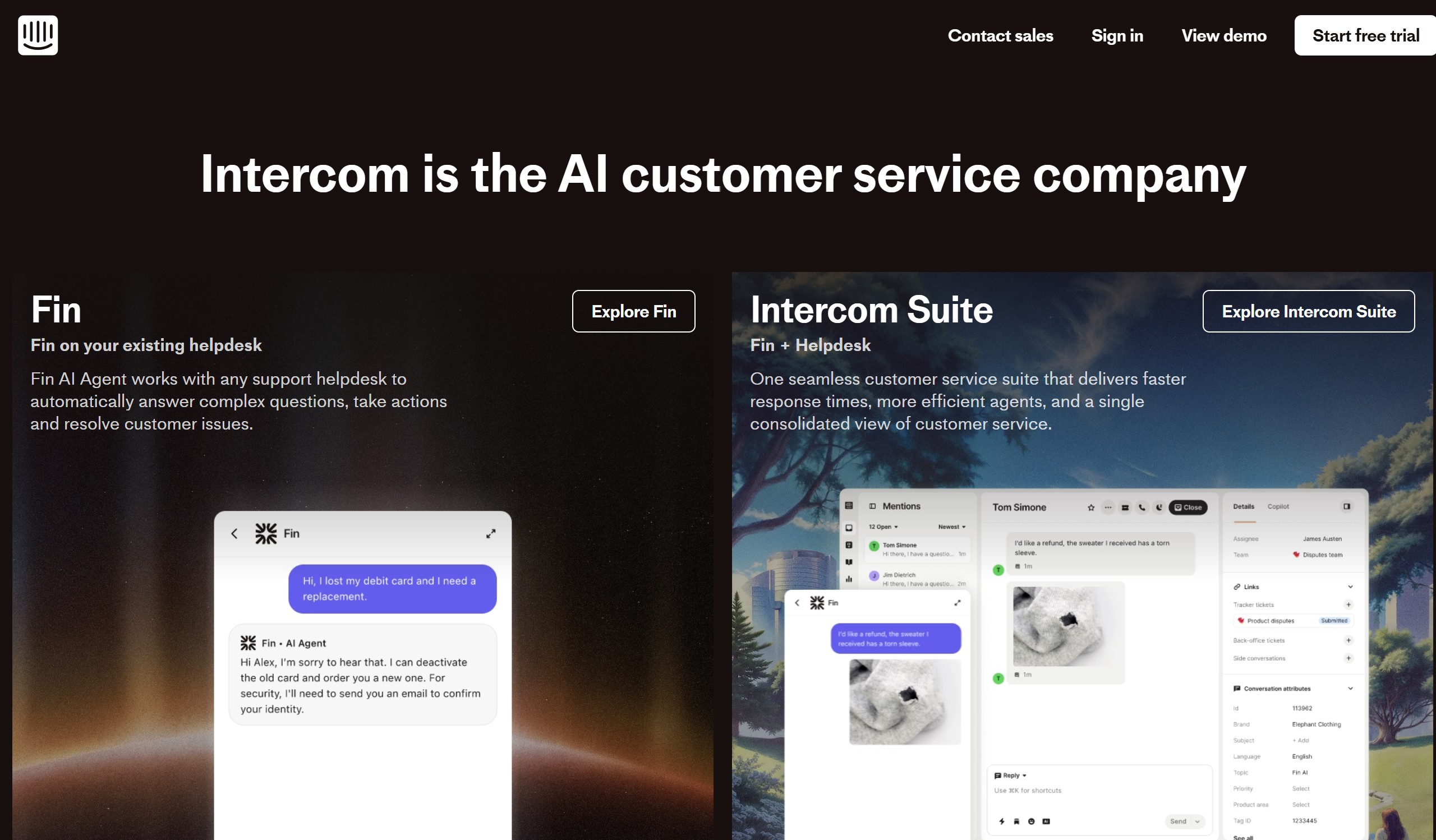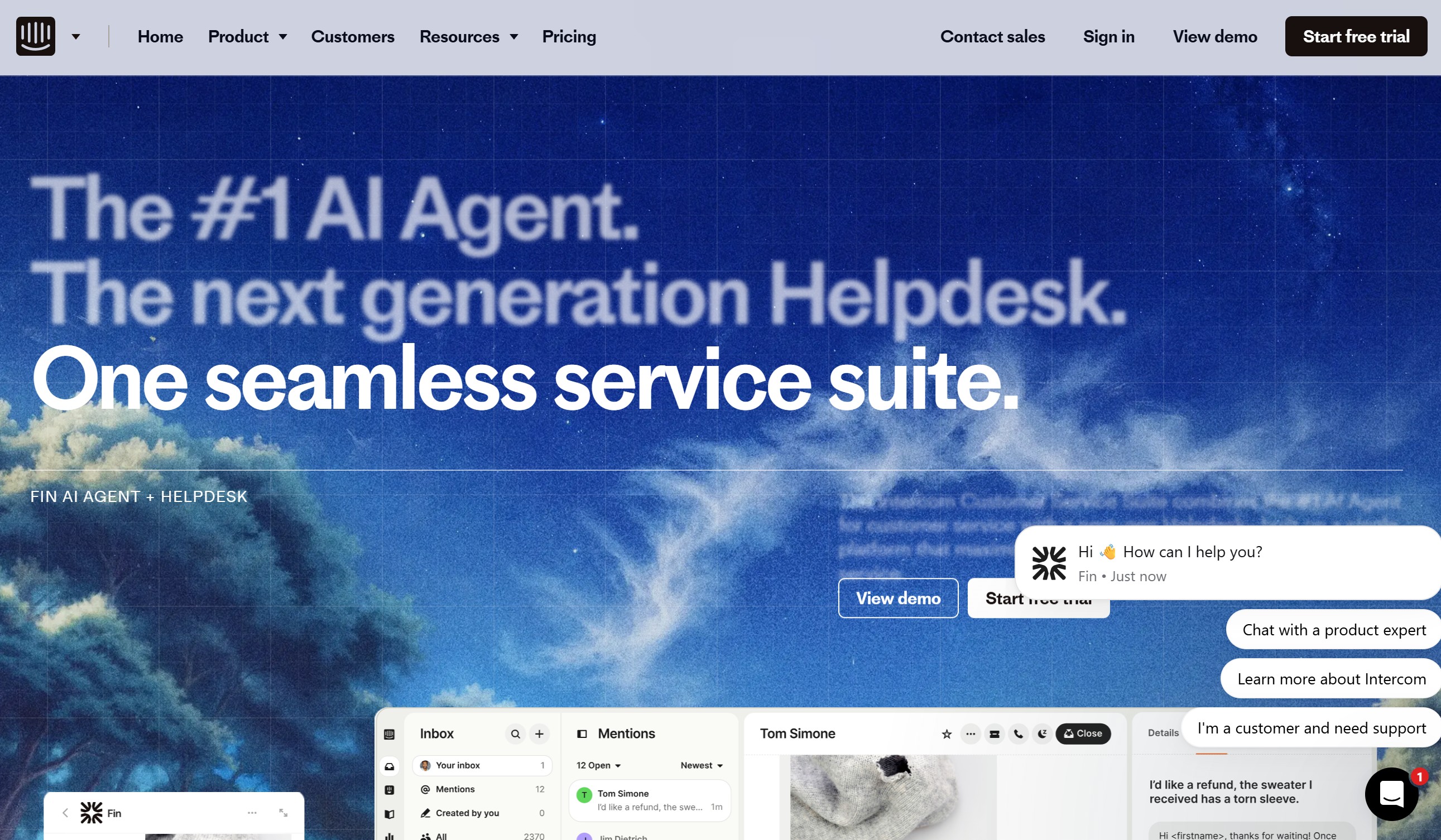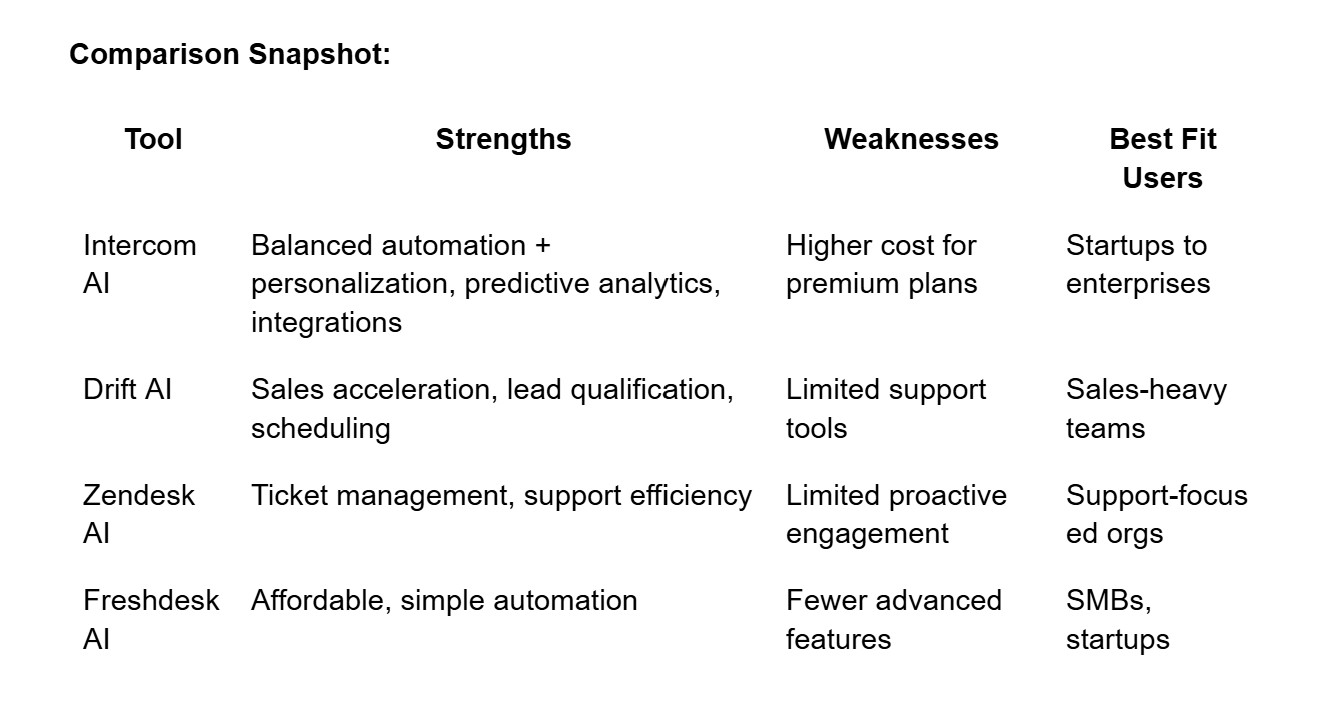Intercom AI Tool Review 2025: Features, Use Cases, Pricing & Top Alternatives Compared

The Intercom AI tool has quickly become one of the most widely discussed solutions in the customer engagement and support space. In 2025, AI-powered communication platforms are no longer optional—they are essential to maintaining responsiveness and delivering personalized service at scale. Intercom has leaned heavily into this trend, evolving from a messaging system into a comprehensive platform powered by artificial intelligence.
Unlike traditional support tools, Intercom integrates AI to automate repetitive tasks, provide real-time insights, and enhance personalization. Businesses that once struggled to balance speed and quality in customer interactions are now leveraging features like AI-driven chatbots, automated ticket routing, and predictive analytics to improve both efficiency and customer satisfaction.
This article provides a comprehensive Intercom AI tool review, highlighting its features, real-world use cases, and performance in 2025. We’ll also compare Intercom with alternatives, explore pricing, and assess whether it’s truly the best AI-powered communication solution for businesses of all sizes.
2. What is the Intercom AI Tool?
The Intercom AI tool is an AI-powered software designed to transform customer communication.
It builds on Intercom’s foundation as a messaging-first customer support platform.
AI features were introduced to automate common workflows and scale personalized engagement.
The tool includes chatbots that handle routine questions instantly.
It routes complex tickets to the right human agents without delay.
Predictive insights help teams anticipate customer needs before issues arise.
Intercom AI also supports knowledge base automation, generating answers from content libraries.
Its interface is intuitive, making it accessible even for beginners.
The tool integrates with CRMs and marketing software to unify customer data.
This allows businesses to track conversations alongside sales and support interactions.
By centralizing information, Intercom reduces silos between marketing, sales, and service teams.
The software is widely used in SaaS, e-commerce, and B2B organizations.
Startups value it for affordable automation and time savings.
Enterprises rely on it for scalability and cross-departmental collaboration.
The Intercom AI tool also includes personalization at scale.
Conversations are tailored to user behavior, purchase history, and preferences.
This improves customer satisfaction while increasing upsell and retention opportunities.
The platform offers Intercom AI apps that extend features through integrations.
Users can connect with tools like Slack, Salesforce, and HubSpot.
These integrations make Intercom a versatile AI-powered customer engagement ecosystem.
Overall, the Intercom AI tool is both a productivity driver and a customer success enhancer.
It balances automation with personalization, making it a strong contender in the AI tool market of 2025.
3. Key Features & Benefits of Intercom AI

What makes the Intercom AI tool stand out is the breadth of features it offers across support, marketing, and sales functions. Each feature is designed not just to save time, but to elevate the customer experience in ways traditional systems cannot.
One of the core features is AI-powered chatbots. These bots can instantly respond to customer queries, qualify leads, and escalate issues when needed. Unlike scripted bots, they rely on natural language processing to understand intent, which results in smoother, human-like interactions.
Another major feature is automated ticket routing. The system uses AI to analyze incoming messages and assign them to the right department or agent. This reduces delays, improves first-response times, and keeps customer frustration low. For businesses where speed matters, this feature can be a game-changer.
Knowledge base automation is another standout. Intercom AI can draw from a company’s help articles and suggest accurate answers to both customers and agents. This reduces manual work and ensures consistency in responses, which is especially valuable for scaling businesses.
Personalization is where Intercom excels. The AI uses customer data and interaction history to tailor responses and recommendations. For example, an e-commerce customer asking about shipping might automatically be offered a discount code for their next order. This combination of support and marketing builds loyalty while increasing revenue.
Intercom AI also enhances analytics and reporting. Teams can track metrics like conversation resolution rates, customer satisfaction, and support efficiency. Predictive analytics even forecast customer behavior, helping companies proactively address churn risks or upsell opportunities.
Additional benefits include:
- Seamless integration with tools like Salesforce, HubSpot, and Slack.
- AI-powered email follow-ups for leads and customers.
- Scalability across industries from startups to enterprise.
- A clean interface that supports both beginners and advanced users.
Businesses adopting Intercom AI report reductions in resolution times by as much as 40% and improvements in customer satisfaction scores of 20–30%. These statistics highlight how AI-powered customer engagement tools like Intercom are becoming critical to modern business success.
In short, the Intercom AI tool isn’t just another chatbot—it’s a comprehensive AI-powered communication platform that delivers measurable improvements across support, marketing, and sales. For businesses in 2025, it offers a balance of affordability, scalability, and innovation that few competitors can match.
4. Intercom AI Tool Review 2025: Real-World Performance
The Intercom AI tool has been tested across industries from SaaS to e-commerce.
In 2025, its adoption has grown due to its balance of automation and personalization.
Businesses report faster response times and measurable improvements in customer satisfaction.
Agents save hours weekly because chatbots handle common inquiries automatically.
This frees human teams to focus on complex, relationship-driven interactions.
The user interface is praised for being intuitive and easy to learn.
Even beginners can navigate workflows without needing advanced technical training.
The dashboard presents data clearly, allowing managers to track KPIs efficiently.
Performance metrics often show resolution time dropping by 30–40%.
Customer satisfaction surveys indicate improvements of up to 20%.
The tool’s AI routing system prevents misdirected queries from frustrating customers.
This ensures faster first-contact resolution and more accurate support experiences.
Intercom AI integrates seamlessly with CRMs like Salesforce and HubSpot.
This reduces data silos and keeps customer information consistent across departments.
Sales and marketing teams benefit as much as support teams.
Automated insights identify potential upsell or retention opportunities.
These insights allow businesses to act proactively instead of reactively.
The platform’s predictive analytics feature has become a differentiator.
It forecasts customer behavior trends based on previous interactions.
This enables companies to reduce churn by reaching out at the right time.
Some users, however, note drawbacks in customization flexibility.
Advanced personalization requires technical setup beyond basic features.
Pricing is another frequently cited challenge for smaller businesses.
The affordable intercom ai tool plans cover essentials, but advanced AI requires premium tiers.
Enterprises find value in scalability, but SMBs may hesitate at higher costs.
Despite this, Intercom ranks highly among top intercom ai tools in 2025.
Analysts highlight its strong blend of usability, integrations, and innovation.
Businesses comparing intercom ai tool alternatives find that competitors often excel in niches.
Drift focuses more on sales acceleration, while Zendesk AI shines in ticket management.
Intercom stands out for blending sales, marketing, and support within one ecosystem.
Pros commonly cited include ease of use, speed, and breadth of features.
Cons revolve around cost and setup complexity for advanced workflows.
Still, most reviews conclude that the benefits outweigh the challenges.
The intercom ai tool review 2025 paints a picture of a maturing, stable platform.
It is best suited for businesses seeking long-term customer engagement strategies.
5. Intercom AI Tool vs Competitors
When comparing the Intercom AI tool to competitors, it is important to look at usability, features, pricing, and scalability. Each platform takes a slightly different approach to customer engagement, and businesses must align their choice with their goals.
Intercom’s strength lies in its balance of automation and personalization. Its AI-driven chatbots, predictive analytics, and robust integrations make it one of the most complete platforms in the market. In contrast, tools like Drift, Zendesk AI, and Freshdesk AI often emphasize one area over others.
Intercom vs Drift
Drift has built its reputation around sales acceleration. It uses AI to qualify leads, schedule meetings, and speed up sales cycles. Intercom, on the other hand, emphasizes customer engagement across the entire journey. While Drift excels at lead generation, Intercom provides stronger support tools.
- Drift = great for revenue-focused teams.
- Intercom = better for lifecycle engagement and support.
Intercom vs Zendesk AI
Zendesk AI focuses on ticketing efficiency and knowledge base management. It is excellent for service-heavy organizations where the priority is resolving large volumes of support queries. Intercom provides more proactive engagement, starting conversations before they become tickets.
- Zendesk AI = reactive support focus.
- Intercom = proactive customer engagement.
Intercom vs Freshdesk AI
Freshdesk AI positions itself as an affordable AI tool for small to mid-sized businesses. It offers chatbots, ticket automation, and reporting but lacks Intercom’s depth in personalization and integrations. Businesses on tight budgets may prefer Freshdesk, but enterprises find Intercom’s scalability more compelling.
- Freshdesk = budget-friendly AI solution.
- Intercom = advanced platform for scaling organizations.
Comparison Snapshot:

Ultimately, the intercom ai tool comparison shows that Intercom is most effective for businesses seeking an all-in-one platform that spans sales, marketing, and support. While alternatives have their strengths, Intercom remains a leader in providing a unified, AI-powered engagement ecosystem.
6. Pricing & Plans Explained
Intercom AI offers both free and paid tiers.
The free plan includes basic messaging and limited chatbot features.
It is designed for beginners and very small businesses.
Paid plans unlock advanced automation and personalization.
Pricing is tiered based on business size and feature needs.
The Starter plan is aimed at growing businesses with limited budgets.
The Growth plan adds predictive analytics and deeper integrations.
The Enterprise plan includes advanced AI-driven workflows and support.
Intercom’s pricing is considered premium compared to some alternatives.
However, the ROI often justifies the cost for larger organizations.
Startups sometimes struggle with the affordability of higher tiers.
Discounts are occasionally available for annual contracts.
Users value the scalability that pricing tiers provide.
Intercom AI also offers a trial period for new users.
This allows businesses to test before committing.
Overall, the tool balances affordability and enterprise-grade capabilities.
The affordable intercom ai tool tier serves beginners, while advanced tiers cater to enterprises.
7. Best Use Cases of Intercom AI Tool
The Intercom AI tool shines in multiple use cases, making it one of the most versatile platforms in customer engagement. From startups to enterprises, different organizations can leverage its features to drive value.
Startups and Small Businesses
Intercom provides affordable plans that include basic automation, chatbots, and messaging. For new businesses, this is an efficient way to manage customer attraction without hiring large support teams.
SaaS Companies
SaaS businesses rely on lifecycle management, and Intercom AI supports this by automating onboarding, customer support, and upsell campaigns. The ability to integrate with CRMs ensures consistent brand messaging across customer touchpoints.
E-commerce
Online retailers use Intercom AI for real-time support, abandoned cart recovery, and personalized product recommendations. These features help reduce churn and drive conversions during critical shopping moments.
Enterprise Organizations
For large businesses, Intercom’s predictive analytics and advanced routing capabilities scale across multiple teams. Enterprises benefit from data-driven insights that guide both support and marketing campaigns.
Support-Heavy Teams
Intercom’s knowledge base automation and AI ticket routing streamline workflows. This reduces response times while maintaining consistency in advertising slogans and customer communication.
Key Benefits Across Use Cases:
- Automates repetitive support tasks.
- Personalizes engagement at scale.
- Increases efficiency across teams.
- Improves retention through proactive communication.
- Aligns with broader marketing strategy.
In short, the intercom ai tool use cases cover everything from startups experimenting with automation to enterprises refining global customer engagement strategies.
8. Final Verdict
The Intercom AI tool has firmly established itself as one of the leading AI-powered customer engagement platforms in 2025. Its blend of automation, personalization, and predictive analytics makes it an invaluable resource for businesses that want to deliver faster, smarter, and more consistent customer experiences.
For startups and small businesses, Intercom’s accessible entry-level plans offer a strong starting point, although affordability at higher tiers can be a challenge. For enterprises, its scalability, integrations, and advanced AI features provide the kind of long-term value that justifies its premium cost.
Compared to top intercom ai tool alternatives like Drift, Zendesk AI, and Freshdesk, Intercom shines in its ability to unify sales, marketing, and support in a single ecosystem. While competitors specialize in narrower functions, Intercom remains one of the few tools that delivers a full lifecycle engagement strategy.
The platform is not without drawbacks—pricing and advanced setup complexity are often cited—but most reviews conclude that its benefits outweigh these challenges. With measurable improvements in customer satisfaction, faster response times, and streamlined workflows, Intercom proves that AI-driven communication is no longer just a trend, but a business necessity.
For organizations looking to strengthen brand messaging, improve customer attraction, and scale engagement in 2025, the Intercom AI tool is absolutely worth the investment.
9. FAQ
1. What is the Intercom AI tool used for?
The Intercom AI tool is designed for customer engagement, automating chat support, ticket routing, personalization, and predictive analytics to improve customer experiences.
2. Is there a free version of Intercom AI?
Yes, Intercom offers a free version with limited features. However, most advanced AI-powered automation and analytics are only available in paid tiers.
3. How does Intercom AI compare to Drift or Zendesk AI?
Drift excels in sales acceleration, while Zendesk AI focuses on ticketing efficiency. Intercom differentiates itself by blending sales, marketing, and support within one AI-powered platform.
4. Can small businesses benefit from Intercom AI?
Absolutely. Many startups use the affordable plans to automate common support tasks and free up resources. As businesses scale, they can upgrade to advanced tiers for more AI features.
5. What are the main features of the Intercom AI tool?
Key features include AI chatbots, automated ticket routing, knowledge base automation, predictive insights, personalized engagement, and integrations with CRMs like Salesforce and HubSpot.
6. Is Intercom AI worth it in 2025?
Yes. With businesses reporting up to 40% reductions in resolution time and 20–30% improvements in customer satisfaction, Intercom AI has proven measurable value across industries.
7. Who should consider Intercom AI over its alternatives?
Organizations that want an all-in-one solution for sales, marketing, and support—rather than specialized tools—will find Intercom AI to be the strongest option in 2025.
